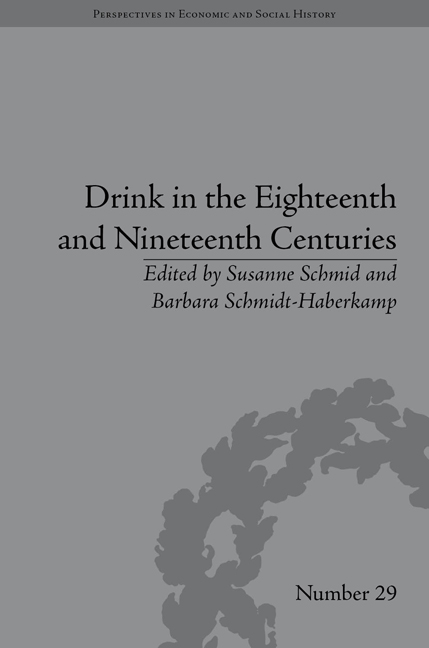Book contents
- Frontmatter
- CONTENTS
- Acknowledgements
- List of Contributors
- List of Figures and Tables
- Introduction
- Part I Ritual and Material Culture
- Part II Institutions and Social Class
- 3 Café or Coffeehouse? Transnational Histories of Coffee and Sociability
- 4 Claret at a Premium: Ned Ward, the True Tory Defender of Fine Wines?
- 5 Eighteenth-Century Travellers and the Country Inn
- 6 Drinking, Fighting and Working-Class Sociability in Nineteenth-Century Britain
- Part III Temperance and the Misery of Alcohol
- Part IV Intoxication and Therapy
- Part V Case Studies: Rum, Cocoa and Magical Potions
- Notes
- Index
4 - Claret at a Premium: Ned Ward, the True Tory Defender of Fine Wines?
from Part II - Institutions and Social Class
- Frontmatter
- CONTENTS
- Acknowledgements
- List of Contributors
- List of Figures and Tables
- Introduction
- Part I Ritual and Material Culture
- Part II Institutions and Social Class
- 3 Café or Coffeehouse? Transnational Histories of Coffee and Sociability
- 4 Claret at a Premium: Ned Ward, the True Tory Defender of Fine Wines?
- 5 Eighteenth-Century Travellers and the Country Inn
- 6 Drinking, Fighting and Working-Class Sociability in Nineteenth-Century Britain
- Part III Temperance and the Misery of Alcohol
- Part IV Intoxication and Therapy
- Part V Case Studies: Rum, Cocoa and Magical Potions
- Notes
- Index
Summary
I
‘I have no apology to offer for Ned Ward’. Howard Troyer's disclaimer of warranty, made in 1946, responds to the continuing climate of Victorian criticism prevailing in the first half of the twentieth century. In making this statement, Troyer, the author of a book-length study on Ward, bowed to respectable academic forefathers like Walter Besant, who dismissed Ward's style of writing as ‘unsavoury’:
The coarseness prevalent in the eighteenth century, the gross indecencies and ribaldry of its songs, of the daily and common talk, makes itself felt in the whole of its literature … when we consult the unsavoury books of Ned Ward and Tom Brown; when we read how the ladies spoke freely of things … there is nothing left but to confess that of all the centuries which have sinned in this respect – they all have sinned, including our own – the eighteenth century is the worst.
Due to the cultural turn in the humanities, a turn away from moral commitment, aesthetic contemplation or deconstruction, the writings of Ward should by now have become acceptable to researchers. Still, even promoters of this paradigm shift may raise objections in the face of inconsistencies and discrepancies in this new field of research, and acknowledged Pope and Swift experts might feel unease about seeing ‘Grubstreeters’ like Ward appear alongside the greatest minds of the period.
- Type
- Chapter
- Information
- Drink in the Eighteenth and Nineteenth Centuries , pp. 47 - 58Publisher: Pickering & ChattoFirst published in: 2014



